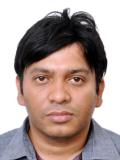
Rajib Sutradhar
Jawaharlal Nehru University
You won the 2015 Uma Lele Mentor Fellowship for your research proposal: How Does the Dynamics of Smallholder Participation in the Supermarket Driven Marketing System Change and its Effect on Rural Livelihood, how is your research progressing?Jawaharlal Nehru University
It is my privilege to receive the Uma Lele Mentor Fellowship which is facilitating my collaboration with my mentor Marc F. Bellemare to work on a panel data collected over a period of 4 years. We have completed the second phase of the household survey in March this year, with the data from the 1st period already collected in year 2010. I am planning to make some short time visits to Minnesota in the second half of this year to work with Marc on the estimation of the welfare impact on smallholders of supplying to supermarkets.
Your mentor is Marc Bellemare; how did you two connect on this research topic?
My research for doctoral dissertation was on the impact assessment of supermarket procurement on smallholders in Indian state of Rajasthan. As a graduate student, I have come across some of highly cited articles coauthored by Marc Bellemare. When I went to Minnesota to present findings of my PhD research in AAEA Annual Meeting in July 2014, thanks to the travel grant awarded by AAEA to few economists from Low and Middle income countries, I got to know about Uma Lele mentor fellowship awarded by AAEA to encourage research collaboration with member of AAEA. In Annual Meeting, I was fortunate to meet Marc Bellemare and I saw Mentor Fellowship as a window of opportunity to collaborate with someone like Marc who I have been following since I started working in my research area. I discussed with Marc about my present research. Marc liked my research proposal and immediately agreed to my proposal to collaborate through Uma Lele Mentor Fellowship.
What led you to pursue food and agricultural economics?
I was born in a family with agricultural background in Assam, a state located in North eastern part of India, a region marked by little urbanization and poor infrastructure, with many families still drawing a part or whole of their livelihood from agriculture. Naturally, the problems facing the farming community in the region has intrigued me that culminated in taking up agricultural economics as an area of specialization in Masters program. After my Master Program I had an internship with International Food Policy Research Institute in their New Delhi office. During my stint at IFPRI, I had implemented a number of large survey based projects on value chain of crops such as potato and makhana (an aqua crop) in the Indian state of Bihar, the poorest state in the country, in close collaboration with Bart Minten, Senior Research Fellow at the institute and Prof Thomas Reardon from Michigan State University. The insights that I had from numerous interaction with resource poor farmers in the state opened my eyes to problems that such farmers face in selling their produce in a setting marked by poor infrastructure. From the perspectives of Development Economics, I realized that famous statement by Theodore Schultz that ‘ if we knew the economics of agriculture, we would know the economics of being poor’ still holds true in the large part of developing world including India. There is no looking back since then, as I took up research in value chain for my doctoral dissertation.
What advice would you offer aspiring agricultural/applied economists?
I feel that it is important to take insights from field visits before one pursues his/ her research. Given the large diversity within a country, atleast in a country as big as India, it is also important to realize that one size fits all approach does not work. In the pursuit of modeling, we should not lose sight of such diversity.
This post is part of an ongoing series of profiles of AAEA members. Have a suggestion for a future profile? Send them to Info@aaea.org.


I am sure you will be contributing a lot in this topic. No one has worked on panel data in your topic. All the Best Sir.Kedar Vishnu, Ph.D students, ISEC Bangalore, India
ReplyDeleteVery encouraging and insightful for young researchers. Importance of field visits as a fact gathering tool amidst such diversity is a great advice. All the best Rajib, well done.
ReplyDeleteVery nice. Keep up the good work and all the bes!
ReplyDeleteRaju R Gogoi